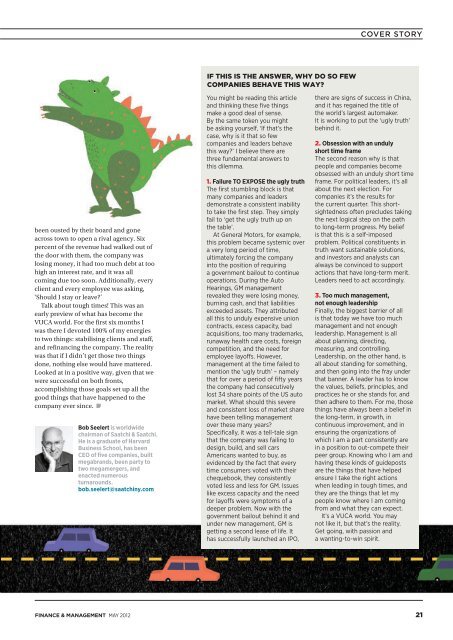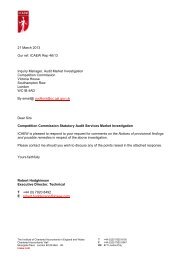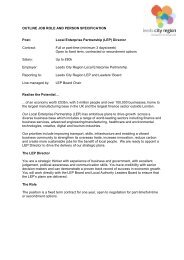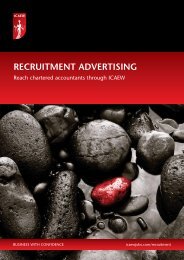Hit the road Positive leadership for troubled times - ICAEW
Hit the road Positive leadership for troubled times - ICAEW
Hit the road Positive leadership for troubled times - ICAEW
Create successful ePaper yourself
Turn your PDF publications into a flip-book with our unique Google optimized e-Paper software.
COVER STORY<br />
IF THIS IS THE ANSWER, WHY DO SO FEW<br />
COMPANIES BEHAVE THIS WAY?<br />
been ousted by <strong>the</strong>ir board and gone<br />
across town to open a rival agency. Six<br />
percent of <strong>the</strong> revenue had walked out of<br />
<strong>the</strong> door with <strong>the</strong>m, <strong>the</strong> company was<br />
losing money, it had too much debt at too<br />
high an interest rate, and it was all<br />
coming due too soon. Additionally, every<br />
client and every employee was asking,<br />
‘Should I stay or leave?’<br />
Talk about tough <strong>times</strong>! This was an<br />
early preview of what has become <strong>the</strong><br />
VUCA world. For <strong>the</strong> first six months I<br />
was <strong>the</strong>re I devoted 100% of my energies<br />
to two things: stabilising clients and staff,<br />
and refinancing <strong>the</strong> company. The reality<br />
was that if I didn’t get those two things<br />
done, nothing else would have mattered.<br />
Looked at in a positive way, given that we<br />
were successful on both fronts,<br />
accomplishing those goals set up all <strong>the</strong><br />
good things that have happened to <strong>the</strong><br />
company ever since.<br />
Bob Seelert is worldwide<br />
chairman of Saatchi & Saatchi.<br />
He is a graduate of Harvard<br />
Business School, has been<br />
CEO of five companies, built<br />
megabrands, been party to<br />
two megamergers, and<br />
enacted numerous<br />
turnarounds.<br />
bob.seelert@saatchiny.com<br />
You might be reading this article<br />
and thinking <strong>the</strong>se five things<br />
make a good deal of sense.<br />
By <strong>the</strong> same token you might<br />
be asking yourself, ‘If that’s <strong>the</strong><br />
case, why is it that so few<br />
companies and leaders behave<br />
this way?’ I believe <strong>the</strong>re are<br />
three fundamental answers to<br />
this dilemma.<br />
1. Failure TO EXPOSE <strong>the</strong> ugly truth<br />
The first stumbling block is that<br />
many companies and leaders<br />
demonstrate a consistent inability<br />
to take <strong>the</strong> first step. They simply<br />
fail to ‘get <strong>the</strong> ugly truth up on<br />
<strong>the</strong> table’.<br />
At General Motors, <strong>for</strong> example,<br />
this problem became systemic over<br />
a very long period of time,<br />
ultimately <strong>for</strong>cing <strong>the</strong> company<br />
into <strong>the</strong> position of requiring<br />
a government bailout to continue<br />
operations. During <strong>the</strong> Auto<br />
Hearings, GM management<br />
revealed <strong>the</strong>y were losing money,<br />
burning cash, and that liabilities<br />
exceeded assets. They attributed<br />
all this to unduly expensive union<br />
contracts, excess capacity, bad<br />
acquisitions, too many trademarks,<br />
runaway health care costs, <strong>for</strong>eign<br />
competition, and <strong>the</strong> need <strong>for</strong><br />
employee layoffs. However,<br />
management at <strong>the</strong> time failed to<br />
mention <strong>the</strong> ‘ugly truth’ – namely<br />
that <strong>for</strong> over a period of fifty years<br />
<strong>the</strong> company had consecutively<br />
lost 34 share points of <strong>the</strong> US auto<br />
market. What should this severe<br />
and consistent loss of market share<br />
have been telling management<br />
over <strong>the</strong>se many years?<br />
Specifically, it was a tell-tale sign<br />
that <strong>the</strong> company was failing to<br />
design, build, and sell cars<br />
Americans wanted to buy, as<br />
evidenced by <strong>the</strong> fact that every<br />
time consumers voted with <strong>the</strong>ir<br />
chequebook, <strong>the</strong>y consistently<br />
voted less and less <strong>for</strong> GM. Issues<br />
like excess capacity and <strong>the</strong> need<br />
<strong>for</strong> layoffs were symptoms of a<br />
deeper problem. Now with <strong>the</strong><br />
government bailout behind it and<br />
under new management, GM is<br />
getting a second lease of life. It<br />
has successfully launched an IPO,<br />
<strong>the</strong>re are signs of success in China,<br />
and it has regained <strong>the</strong> title of<br />
<strong>the</strong> world’s largest automaker.<br />
It is working to put <strong>the</strong> ‘ugly truth’<br />
behind it.<br />
2. Obsession with an unduly<br />
short time frame<br />
The second reason why is that<br />
people and companies become<br />
obsessed with an unduly short time<br />
frame. For political leaders, it’s all<br />
about <strong>the</strong> next election. For<br />
companies it’s <strong>the</strong> results <strong>for</strong><br />
<strong>the</strong> current quarter. This shortsightedness<br />
often precludes taking<br />
<strong>the</strong> next logical step on <strong>the</strong> path<br />
to long-term progress. My belief<br />
is that this is a self-imposed<br />
problem. Political constituents in<br />
truth want sustainable solutions,<br />
and investors and analysts can<br />
always be convinced to support<br />
actions that have long-term merit.<br />
Leaders need to act accordingly.<br />
3. Too much management,<br />
not enough <strong>leadership</strong><br />
Finally, <strong>the</strong> biggest barrier of all<br />
is that today we have too much<br />
management and not enough<br />
<strong>leadership</strong>. Management is all<br />
about planning, directing,<br />
measuring, and controlling.<br />
Leadership, on <strong>the</strong> o<strong>the</strong>r hand, is<br />
all about standing <strong>for</strong> something,<br />
and <strong>the</strong>n going into <strong>the</strong> fray under<br />
that banner. A leader has to know<br />
<strong>the</strong> values, beliefs, principles, and<br />
practices he or she stands <strong>for</strong>, and<br />
<strong>the</strong>n adhere to <strong>the</strong>m. For me, those<br />
things have always been a belief in<br />
<strong>the</strong> long-term, in growth, in<br />
continuous improvement, and in<br />
ensuring <strong>the</strong> organizations of<br />
which I am a part consistently are<br />
in a position to out-compete <strong>the</strong>ir<br />
peer group. Knowing who I am and<br />
having <strong>the</strong>se kinds of guideposts<br />
are <strong>the</strong> things that have helped<br />
ensure I take <strong>the</strong> right actions<br />
when leading in tough <strong>times</strong>, and<br />
<strong>the</strong>y are <strong>the</strong> things that let my<br />
people know where I am coming<br />
from and what <strong>the</strong>y can expect.<br />
It’s a VUCA world. You may<br />
not like it, but that’s <strong>the</strong> reality.<br />
Get going, with passion and<br />
a wanting-to-win spirit.<br />
FINANCE & MANAGEMENT MAY 2012<br />
21

















